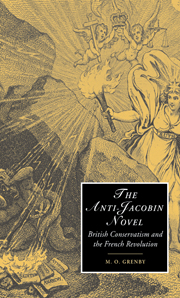Book contents
- Frontmatter
- Contents
- Preface
- Acknowledgements
- Introduction
- 1 Novels reproved and reprieved
- 2 Representing revolution
- 3 The new philosophy
- 4 The vaurien and the hierarchy of Jacobinism
- 5 Levellers, nabobs and the manners of the great: the novel's defence of hierarchy
- 6 The creation of orthodoxy: constructing the anti-Jacobin novel
- 7 Conclusion
- Notes
- Select bibliography
- Index
4 - The vaurien and the hierarchy of Jacobinism
Published online by Cambridge University Press: 22 September 2009
- Frontmatter
- Contents
- Preface
- Acknowledgements
- Introduction
- 1 Novels reproved and reprieved
- 2 Representing revolution
- 3 The new philosophy
- 4 The vaurien and the hierarchy of Jacobinism
- 5 Levellers, nabobs and the manners of the great: the novel's defence of hierarchy
- 6 The creation of orthodoxy: constructing the anti-Jacobin novel
- 7 Conclusion
- Notes
- Select bibliography
- Index
Summary
I must, however, acknowledge that we have some restless Spirits amongst us, who by their seditious Writings have contributed not a little to the Work of Destruction … I thank Heaven the number of such Miscreants is but small, when compared to the Spirit of the whole Nation!
Ann Thomas, Adolphus de Biron (1795?)In the partly mimetic, partly dystopian, world envisaged by the anti-Jacobin novelists, ‘new philosophy’ was the language in which Jacobinism was conveyed and understood, the currency in which it circulated. The new philosophers, however, were not so much Jacobinism's perpetrators, as just the first in the long line of its victims. There were two kinds of miscreants populating the anti-Jacobin novel – those who had been somehow convinced of the virtues of new philosophy, had really believed in all that it seemed to offer for the good of mankind; and those who had been responsible for instilling this conviction, this delusion, who had made dupes of the new philosophers. This second sort of character used new philosophy without ever being quite so naïve as to believe a word of it themselves.
Such men, and in some cases women, I shall rather arbitrarily be referring to as ‘vauriens’, a term imported from the French (from which it translates as a good-for-nothing) by Isaac D'Israeli for the protagonist of his novel of 1797, Vaurien: or, Sketches of the Times.
- Type
- Chapter
- Information
- The Anti-Jacobin NovelBritish Conservatism and the French Revolution, pp. 104 - 125Publisher: Cambridge University PressPrint publication year: 2001



